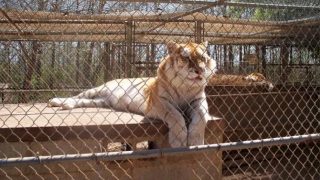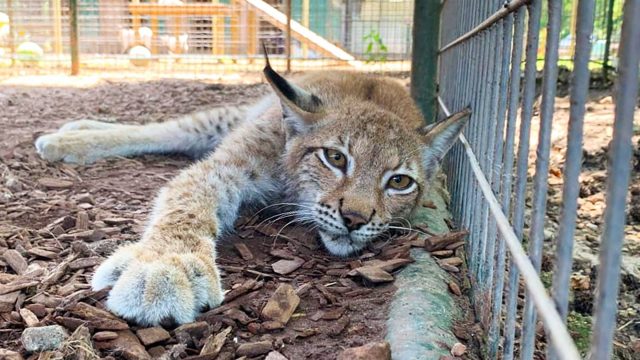
Notice of Intent to Sue Sent to Tiger Creek for Violating Endangered Species Act
The Act has authority to protect federally endangered and threatened animals such as the tigers, lions, and ring-tailed lemurs enduring inadequate treatment at Tiger Creek
Contact: media@aldf.org
Tyler, Texas — The Animal Legal Defense Fund sent notice to the National Foundation for Rescued Animals, a purported animal rescue organization doing business as Tiger Creek Animal Sanctuary, as well as its Chairman and President Brian Werner Ferris and his daughter, Vice Chair and Executive Director, Emily Owen, for allegedly violating the Endangered Species Act (ESA). Known as Tiger Creek, the facility, the Animal Legal Defense Fund argues, violates the ESA’s “take” and “transfer” provisions by harming, harassing, and killing numerous animals—including nine lions and tigers who have died there since 2018–and by transferring members of endangered and threatened species across state lines without the necessary permits.
Extensive photographic and video evidence, first-hand observations, and government analyses — including an official warning issued by the U.S. Department of Agriculture (USDA) — indicate that animals at Tiger Creek believed to be protected by the ESA are mentally and physically suffering. Instances highlighting Tiger Creek’s lack of adequate care for the animals in its facility are detailed in USDA inspection reports, public records, and first-hand accounts of withheld or delayed care. They include a puma named Coco who was euthanized days after he began dragging his leg around his enclosure and became immobile, a tiger named Amir who stopped eating and was found dead in his cage, a tiger named Greg who was euthanized after developing a distended abdomen and rejecting food, a tiger named Nati who had a cyst the size of a quarter in her abdomen that grew over multiple weeks to the size of a dinner plate before rupturing, and a tiger named Tibor who refused to eat after transferring to Tiger Creek before ultimately passing away after spending hours in the rain and laying on his side in his own urine. Tiger Creek also keeps two ESA-protected ring-tailed lemurs, highly social animals who typically live in groups, isolated in separate enclosures with insufficient opportunities for enrichment and play.
“Our notice to Tiger Creek comes after documented instances of inadequate care — including from the USDA — in clear violation of the ESA as animals continue to suffer needlessly without adequate housing, species-specific nutrition, timely veterinary care, or opportunities for enrichment,” says Animal Legal Defense Fund Executive Director Stephen Wells. “We are prepared to file a lawsuit if violations at Tiger Creek are not appropriately addressed.”
The notice letter also alleges that Tiger Creek has violated the “transfer” provision of the ESA by failing to obtain applicable permits from the Secretary of Interior for its acquisition and transfer of endangered animals. For instance, in the past three years alone, Tiger Creek has acquired at least six protected animals out-of-state and transported them in interstate commerce. Tiger Creek acquired tigers Pomfret, Singer, and Nati in December 2018, and Ava, Elouise, and Rosie in March 2019, each from Doc Antle of Netflix’s Tiger King in Myrtle Beach, South Carolina.
The ESA protects any members of species defined as “endangered” or “threatened” from myriad activities that cause them injury, death, or other types of harm. In 2018, the U.S. Court of Appeals for the Eighth Circuit unanimously affirmed the lower court’s decision applying the ESA to protect endangered animals in captivity — setting precedent for future challenges. This precedent setting case was filed by the Animal Legal Defense Fund in 2014 against Cricket Hollow Zoo, a roadside menagerie in Manchester, Iowa, related to inhumane treatment of Siberian tigers and lemurs.





United States: Support the Big Cat Public Safety Act
Urge your federal lawmakers to support legislation that would prohibit the private possession of big cats and make it illegal for exhibitors to allow direct contact with cubs.
Focus Area
How We Work
Related
-
Tentative Settlement Reached in Texas Endangered Species Act Lawsuit
The Animal Legal Defense Fund and National Foundation for Rescued Animals, an animal exhibitor doing business as Tiger Creek Animal Sanctuary, have tentatively reached a settlement, pending the dismissal of the Endangered Species Act lawsuit filed in March 2022.February 28, 2024 Press Release -
Big Cat Public Safety Act Passes the U.S. Senate in Victory for Animals
The bill helps end the rampant abuse of tigers and other big cats in captivity by banning private possessionDecember 6, 2022 Press Release -
After Images of Employee’s Injury from Animal Attack Surface – OSHA Complaint Filed Against Texas Wild Animal Dealer and Roadside Zoo Owner
Graphic images of wound are posted on Tik-Tok by an employee of Gator Park — a facility owned and operated by Jason Clay.April 7, 2022 Press Release



